牛津译林版(2019)必修 第三册Unit 4 Scientists who changed the world Extended Reading课件(共33张PPT)
文档属性
| 名称 | 牛津译林版(2019)必修 第三册Unit 4 Scientists who changed the world Extended Reading课件(共33张PPT) |
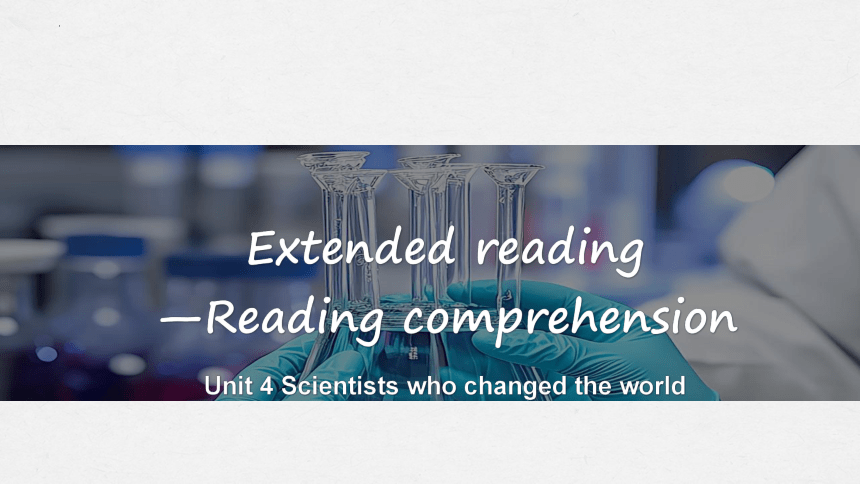
|
|
| 格式 | pptx | ||
| 文件大小 | 32.1MB | ||
| 资源类型 | 教案 | ||
| 版本资源 | 牛津译林版(2019) | ||
| 科目 | 英语 | ||
| 更新时间 | 2024-03-25 09:41:33 | ||
图片预览

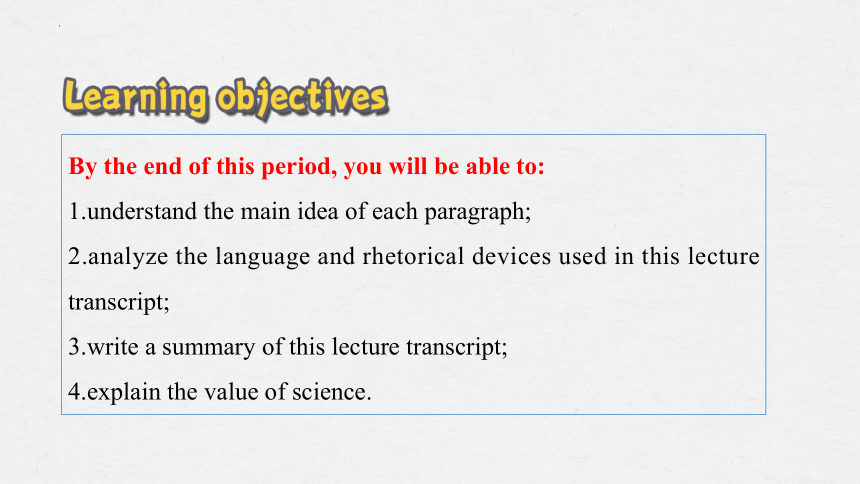
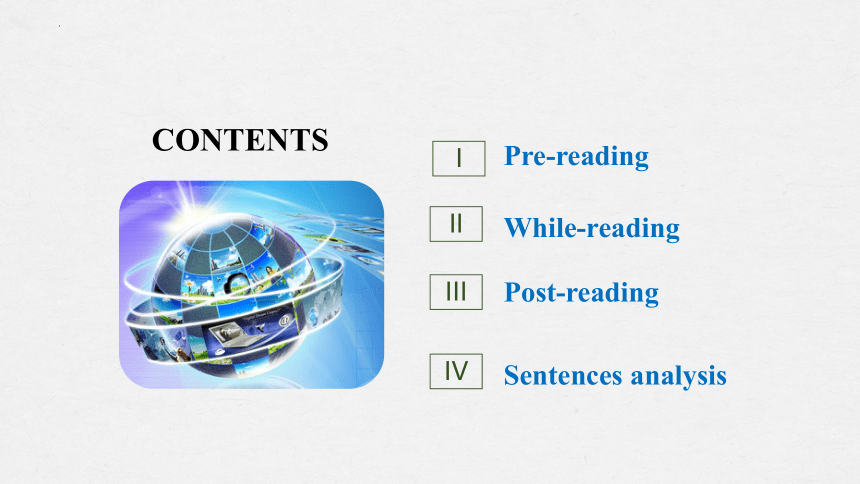



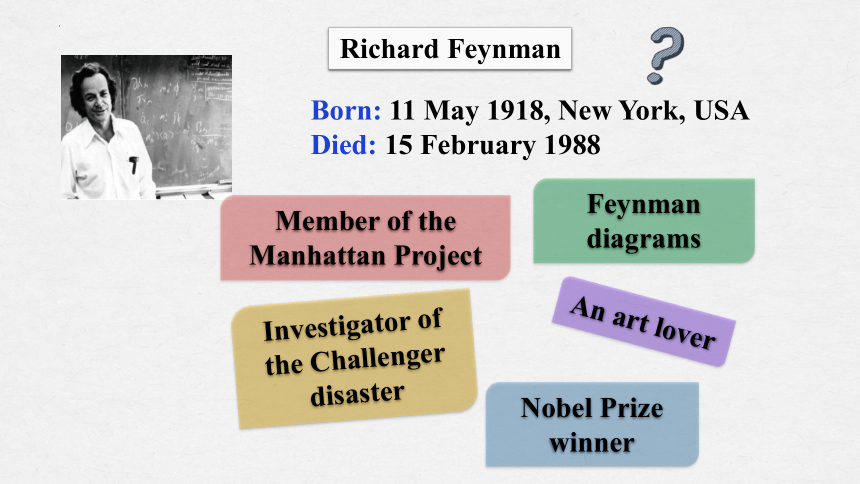
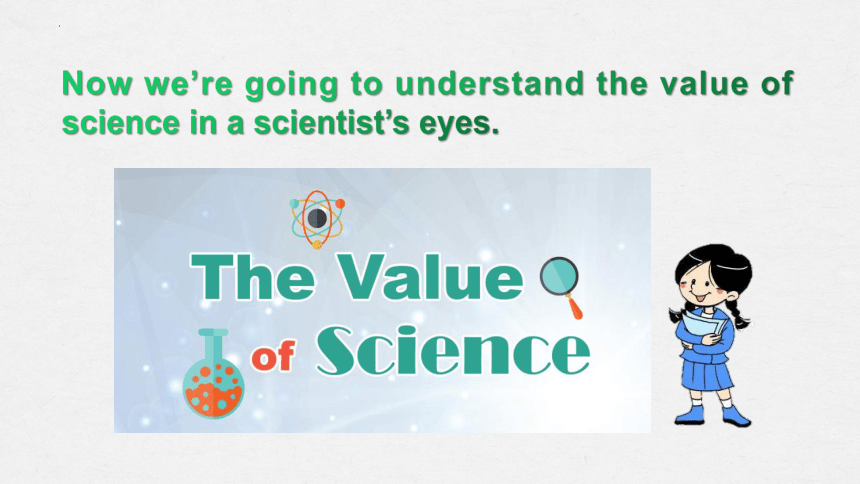




文档简介
(共33张PPT)
Extended reading
—Reading comprehension
Unit 4 Scientists who changed the world
By the end of this period, you will be able to:
1.understand the main idea of each paragraph;
2.analyze the language and rhetorical devices used in this lecture transcript;
3.write a summary of this lecture transcript;
4.explain the value of science.
CONTENTS
Pre-reading
I
While-reading
II
Post-reading
III
Sentences analysis
IV
Does science always make good things for everybody
chemistry
biochemistry
information technology
Science is a double-edged sword.
Pre-reading
Advantages
Due to the advances in medical science, some deadly diseases can be cured by some life-saving medicine, such as qinghaosu, penicillin and so on.
Military science is often misused in wars, which cause countless deaths and injuries.
Disadvantages
The production of hybrid rice can ease the hunger problem.
The invention of the Internet can make our lives more convenient.
Being smartphone addicts is harmful to our real lives.
Industrialized society can damage the environment.
Enjoy a video about the author—Richard Feynman
Nobel Prize winner
Member of the
Manhattan Project
Feynman diagrams
Investigator of the Challenger disaster
An art lover
Richard Feynman
Born: 11 May 1918, New York, USA
Died: 15 February 1988
Now we’re going to understand the value of science in a scientist’s eyes.
1.What type of writing is the text
A.Narrative writing. B.Argumentative writing.
C.Expository writing. D.Practical writing.
2.What’s the main idea of the passage
The main idea of the passage is ___________________.
Activity 1 Fast-reading for basic information.
While-reading
√
the value of science
3. Skim the text and get the main idea of each part.
Part 1(Paras.1-2):___________________.
Part 2(Paras.3-6):___________________.
Part 3(Para.7): ___________________.
Introducing the topic
The value of science
Duties of scientists
1.How did the author introduce the topic
A. By asking a question. B. By making a comparison.
C. By giving an example. D. By quoting a famous saying.
2.What made the author change his attitude to science's value
A.His common sense. B.His research on science.
C.His knowledge about science. D.His experience during the war.
Introduction(Paras.1-2) Introducing the topic
Activity 2 Careful-reading for details
√
√
3. What’s the author’s attitude to science during the war
A.Positive. B.Negative. C.Neutral. D.Indifferent.
√
Before the war
After the war
Making good things
Being useful
and good
Putting our future at risk
Serious and destructive results
The author’s internal confusion
(Paras. 1-2)
Angel
Devil
What is the value of science
1. Summarize 3 points of the value of science.
Para.3:The first value:
Para.4:Another value:
Paras.5-6:The third value:
Scientific knowledge enables us to do and make all things.
It can provide the intellectual enjoyment.
Scientists should have the freedom to doubt.
Main body(Paras.3-6) The value of science
2. According to Feynman, who should be blamed if the power of science is used to do something bad
It is not the science, but the man misusing it that should be blamed.
3. What do these “it” refer to
making good things
scientific knowledge
A. making good things B.an enabling power
C. scientific knowledge D. the first way
4. What does intellectual enjoyment include
Find out words or phrases positive in meaning.
5. What does “the intellectual enjoyment” mean according to Richard
A.Science is great fun and people take delight in learning science.
B.Science is complex and can help people become clever.
C.Science is unlimited and people get pleasure from making constant discoveries.
D.Science is developing and people enjoy the ever-changing scientific knowledge.
√
new stone refers to______________________________
“turn over each new stone” refers to the process of ______________________.
difficult/ problem/confusion....
discovery/exploration
It is an analogy (类比).
6. What does the underlined part refer to
7. Three steps about
scientists’ figuring out problems.
01
02
03
1. _________(adj.)
3. ________(adj.)
uncertain
problem
idea
doubtful
ignorant
2. _________(adj.)
result
Never stop the footsteps towards the truth.
1. What are the duties of scientists
To declare the value of the freedom to doubt.
To teach how doubt is not to be feared but to be welcomed and discussed.
To demand this freedom to all coming generations.
Parallelism
Parallel structures: use the same pattern of words or sentences, the use of which can make the language very powerful and produce significant effects on the readers.
Conclusion(Para.7)
2.What can we infer from the passage
A.Everything has two sides.
B.All is progressing.
C.Authority is science.
D.Science can change everything.
√
3.What is the purpose of the text
A.To comfort worried people.
B.To show the author’s excellent talents to people.
C.To respect famous scientists.
D.To tell people the importance of science.
√
1.Feynman believes that of all science’s many values, the greatest must be the freedom to doubt. How do you understand this?(Critical thinking)
Doubt is the key to knowledge. We shouldn’t take anything for granted. With doubt and curiosity, we keep a fresh mind to our surroundings.
Activity 1 Discussion
Post-reading
2.How do you understand the famous saying, “Science is a double-edged sword” (Divergent thinking)
Students’ own answer.
When the author was younger, he thought science was 1.___________ (obvious) useful. But during the war, it represented the 2. ___________(destroy) of people. “Is there some evil 3._________(involve) in science?”The author asked himself.
Science has many 4.______(value).The first way 5. _____which science is of value is familiar to us—6._________(enable) us to do and make all kinds of things. Another value is the intellectual enjoyment it can provide us with. The third is the freedom of doubt, 7.________ is born out of a deep and strong struggle against authority. But scientists take 8.___ for granted that it is perfectly possible to live and not know. 9. _________(teach) how doubt is not to be feared but to be welcomed and discussed,and to ensure the freedom for all coming generations are scientists' 10.______________(responsible).
obviously
destruction
involved
values
in
enabling
which
it
To teach
responsibilities
Activity 2 Summary
1.Put another way,what is the value of the science I had long devoted myself to—the thing I had loved—when I saw what terrible things it could do
[句式分析] 本句是_________句。句子主句是what is the value of the science...;句中when引导________从句,从句含有一个what引导的_____从句;句中I had long devoted myself to为省略了关系代词__________的_____从句,修饰先行词________;I had loved为省略了关系代词__________的________从句,修饰先行词______。名词短语the thing I had loved作名词science的________。
[自主翻译]
Sentences Analysis
主从复合
时间状语
宾语
that/which
定语
science
that/which
定语
thing
同位语
换言之,在我发现科学可能造成的恶果之后,我一直投身其中的科学,我曾经的挚爱,价值何在?
2.Of course, if we make good things, it is not only to the credit of science;it is also to the credit of the moral choice which led us to good work.
[句式分析] 本句是____________句。句中if引导___________从句;主句中包含了____________________结构;which引导_______从句,修饰先行词________。
[自主翻译]
主从复合
条件状语
not only...(but) also...
定语
choice
当然,如果我们做了好事,不仅归功于科学,还归功于引导我们行善的道德选择。
3.When he has an idea as to what the result is, he is uncertain.
[句式分析] 本句是__________句。其中when引导__________从句,what引导的_______从句作介词短语as to的_______。
[自主翻译]
主从复合
时间状语
宾语
宾语
当他对于结果是什么有主意时,他是不确定的。
4.Now, we scientists take it for granted that it is perfectly possible to live and not know.
[句式分析] 本句为____________句。句中第一个it作__________,that引导的从句作___________;第二个it作________,不定式to live and not know作______________。
[自主翻译]
主从复合
形式宾语
真正的宾语
形式主语
真正的主语
如今,我们科学家理所当然地认为,生而有所不知是完全有可能的。
5.It is our responsibility as scientists, knowing the great progress that is the fruit of freedom of thought, to declare the value of this freedom; to teach how doubt is not to be feared but to be welcomed and discussed; and to demand this freedom as our duty to all coming generations.
[句式分析] 本句中It是_________,to declare...,to teach...,to demand...三个并列的不定式短语是___________;此处knowing the great progress that is the fruit of freedom of thought为动词-ing短语作_______,其中that引导______从句。
[自主翻译]
形式主语
真正的主语
定语
状语
作为科学家,我们明白巨大进步源于思想自由,因此,我们有责任阐明这种自由的价值;我们有责任教导人们怀疑不可怕,它值得欢迎和探讨;我们更有责任强烈要求拥有这一自由,这就是我们对后世的义务。
Homework
Review what we have learnt and preview language points.
THANKS
Extended reading
—Reading comprehension
Unit 4 Scientists who changed the world
By the end of this period, you will be able to:
1.understand the main idea of each paragraph;
2.analyze the language and rhetorical devices used in this lecture transcript;
3.write a summary of this lecture transcript;
4.explain the value of science.
CONTENTS
Pre-reading
I
While-reading
II
Post-reading
III
Sentences analysis
IV
Does science always make good things for everybody
chemistry
biochemistry
information technology
Science is a double-edged sword.
Pre-reading
Advantages
Due to the advances in medical science, some deadly diseases can be cured by some life-saving medicine, such as qinghaosu, penicillin and so on.
Military science is often misused in wars, which cause countless deaths and injuries.
Disadvantages
The production of hybrid rice can ease the hunger problem.
The invention of the Internet can make our lives more convenient.
Being smartphone addicts is harmful to our real lives.
Industrialized society can damage the environment.
Enjoy a video about the author—Richard Feynman
Nobel Prize winner
Member of the
Manhattan Project
Feynman diagrams
Investigator of the Challenger disaster
An art lover
Richard Feynman
Born: 11 May 1918, New York, USA
Died: 15 February 1988
Now we’re going to understand the value of science in a scientist’s eyes.
1.What type of writing is the text
A.Narrative writing. B.Argumentative writing.
C.Expository writing. D.Practical writing.
2.What’s the main idea of the passage
The main idea of the passage is ___________________.
Activity 1 Fast-reading for basic information.
While-reading
√
the value of science
3. Skim the text and get the main idea of each part.
Part 1(Paras.1-2):___________________.
Part 2(Paras.3-6):___________________.
Part 3(Para.7): ___________________.
Introducing the topic
The value of science
Duties of scientists
1.How did the author introduce the topic
A. By asking a question. B. By making a comparison.
C. By giving an example. D. By quoting a famous saying.
2.What made the author change his attitude to science's value
A.His common sense. B.His research on science.
C.His knowledge about science. D.His experience during the war.
Introduction(Paras.1-2) Introducing the topic
Activity 2 Careful-reading for details
√
√
3. What’s the author’s attitude to science during the war
A.Positive. B.Negative. C.Neutral. D.Indifferent.
√
Before the war
After the war
Making good things
Being useful
and good
Putting our future at risk
Serious and destructive results
The author’s internal confusion
(Paras. 1-2)
Angel
Devil
What is the value of science
1. Summarize 3 points of the value of science.
Para.3:The first value:
Para.4:Another value:
Paras.5-6:The third value:
Scientific knowledge enables us to do and make all things.
It can provide the intellectual enjoyment.
Scientists should have the freedom to doubt.
Main body(Paras.3-6) The value of science
2. According to Feynman, who should be blamed if the power of science is used to do something bad
It is not the science, but the man misusing it that should be blamed.
3. What do these “it” refer to
making good things
scientific knowledge
A. making good things B.an enabling power
C. scientific knowledge D. the first way
4. What does intellectual enjoyment include
Find out words or phrases positive in meaning.
5. What does “the intellectual enjoyment” mean according to Richard
A.Science is great fun and people take delight in learning science.
B.Science is complex and can help people become clever.
C.Science is unlimited and people get pleasure from making constant discoveries.
D.Science is developing and people enjoy the ever-changing scientific knowledge.
√
new stone refers to______________________________
“turn over each new stone” refers to the process of ______________________.
difficult/ problem/confusion....
discovery/exploration
It is an analogy (类比).
6. What does the underlined part refer to
7. Three steps about
scientists’ figuring out problems.
01
02
03
1. _________(adj.)
3. ________(adj.)
uncertain
problem
idea
doubtful
ignorant
2. _________(adj.)
result
Never stop the footsteps towards the truth.
1. What are the duties of scientists
To declare the value of the freedom to doubt.
To teach how doubt is not to be feared but to be welcomed and discussed.
To demand this freedom to all coming generations.
Parallelism
Parallel structures: use the same pattern of words or sentences, the use of which can make the language very powerful and produce significant effects on the readers.
Conclusion(Para.7)
2.What can we infer from the passage
A.Everything has two sides.
B.All is progressing.
C.Authority is science.
D.Science can change everything.
√
3.What is the purpose of the text
A.To comfort worried people.
B.To show the author’s excellent talents to people.
C.To respect famous scientists.
D.To tell people the importance of science.
√
1.Feynman believes that of all science’s many values, the greatest must be the freedom to doubt. How do you understand this?(Critical thinking)
Doubt is the key to knowledge. We shouldn’t take anything for granted. With doubt and curiosity, we keep a fresh mind to our surroundings.
Activity 1 Discussion
Post-reading
2.How do you understand the famous saying, “Science is a double-edged sword” (Divergent thinking)
Students’ own answer.
When the author was younger, he thought science was 1.___________ (obvious) useful. But during the war, it represented the 2. ___________(destroy) of people. “Is there some evil 3._________(involve) in science?”The author asked himself.
Science has many 4.______(value).The first way 5. _____which science is of value is familiar to us—6._________(enable) us to do and make all kinds of things. Another value is the intellectual enjoyment it can provide us with. The third is the freedom of doubt, 7.________ is born out of a deep and strong struggle against authority. But scientists take 8.___ for granted that it is perfectly possible to live and not know. 9. _________(teach) how doubt is not to be feared but to be welcomed and discussed,and to ensure the freedom for all coming generations are scientists' 10.______________(responsible).
obviously
destruction
involved
values
in
enabling
which
it
To teach
responsibilities
Activity 2 Summary
1.Put another way,what is the value of the science I had long devoted myself to—the thing I had loved—when I saw what terrible things it could do
[句式分析] 本句是_________句。句子主句是what is the value of the science...;句中when引导________从句,从句含有一个what引导的_____从句;句中I had long devoted myself to为省略了关系代词__________的_____从句,修饰先行词________;I had loved为省略了关系代词__________的________从句,修饰先行词______。名词短语the thing I had loved作名词science的________。
[自主翻译]
Sentences Analysis
主从复合
时间状语
宾语
that/which
定语
science
that/which
定语
thing
同位语
换言之,在我发现科学可能造成的恶果之后,我一直投身其中的科学,我曾经的挚爱,价值何在?
2.Of course, if we make good things, it is not only to the credit of science;it is also to the credit of the moral choice which led us to good work.
[句式分析] 本句是____________句。句中if引导___________从句;主句中包含了____________________结构;which引导_______从句,修饰先行词________。
[自主翻译]
主从复合
条件状语
not only...(but) also...
定语
choice
当然,如果我们做了好事,不仅归功于科学,还归功于引导我们行善的道德选择。
3.When he has an idea as to what the result is, he is uncertain.
[句式分析] 本句是__________句。其中when引导__________从句,what引导的_______从句作介词短语as to的_______。
[自主翻译]
主从复合
时间状语
宾语
宾语
当他对于结果是什么有主意时,他是不确定的。
4.Now, we scientists take it for granted that it is perfectly possible to live and not know.
[句式分析] 本句为____________句。句中第一个it作__________,that引导的从句作___________;第二个it作________,不定式to live and not know作______________。
[自主翻译]
主从复合
形式宾语
真正的宾语
形式主语
真正的主语
如今,我们科学家理所当然地认为,生而有所不知是完全有可能的。
5.It is our responsibility as scientists, knowing the great progress that is the fruit of freedom of thought, to declare the value of this freedom; to teach how doubt is not to be feared but to be welcomed and discussed; and to demand this freedom as our duty to all coming generations.
[句式分析] 本句中It是_________,to declare...,to teach...,to demand...三个并列的不定式短语是___________;此处knowing the great progress that is the fruit of freedom of thought为动词-ing短语作_______,其中that引导______从句。
[自主翻译]
形式主语
真正的主语
定语
状语
作为科学家,我们明白巨大进步源于思想自由,因此,我们有责任阐明这种自由的价值;我们有责任教导人们怀疑不可怕,它值得欢迎和探讨;我们更有责任强烈要求拥有这一自由,这就是我们对后世的义务。
Homework
Review what we have learnt and preview language points.
THANKS
同课章节目录
- Unit 1 Nature in the balance
- Welcome to the unit
- Reading
- Grammar and usage
- Integrated skills
- Extended reading
- Project
- Unit 2 Natural disasters
- Welcome to the unit
- Reading
- Grammar and usage
- Integrated skills
- Extended reading
- Project
- Unit 3 The world online
- Welcome to the unit
- Reading
- Grammar and usage
- Integrated skills
- Extended reading
- Project
- Unit 4 Scientists who changed the world
- Welcome to the unit
- Reading
- Grammar and usage
- Integrated skills
- Extended reading
- Project
